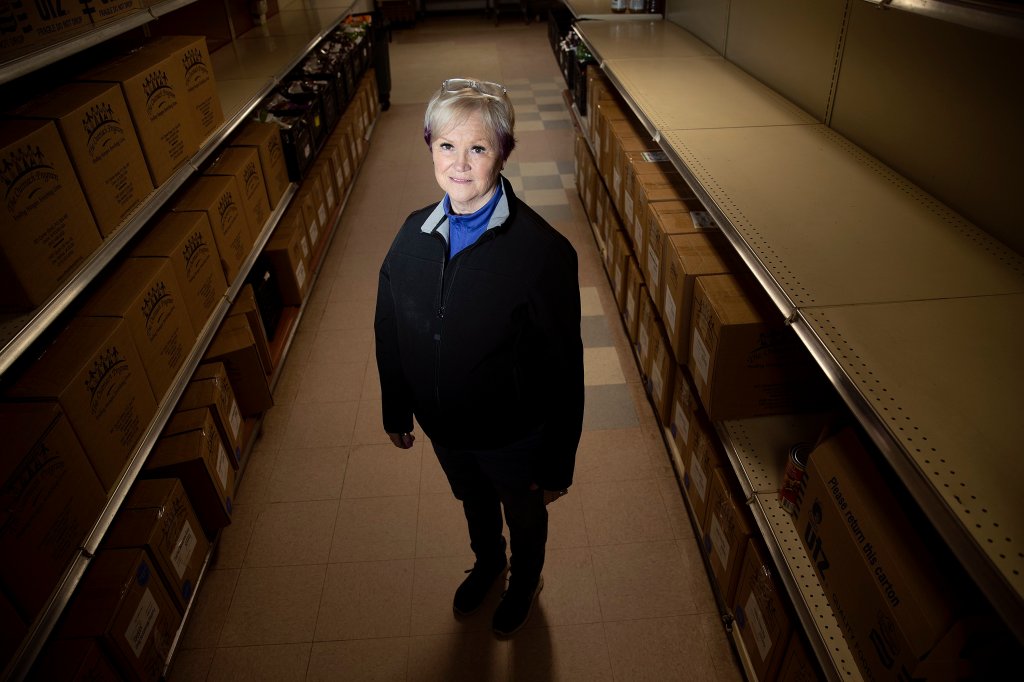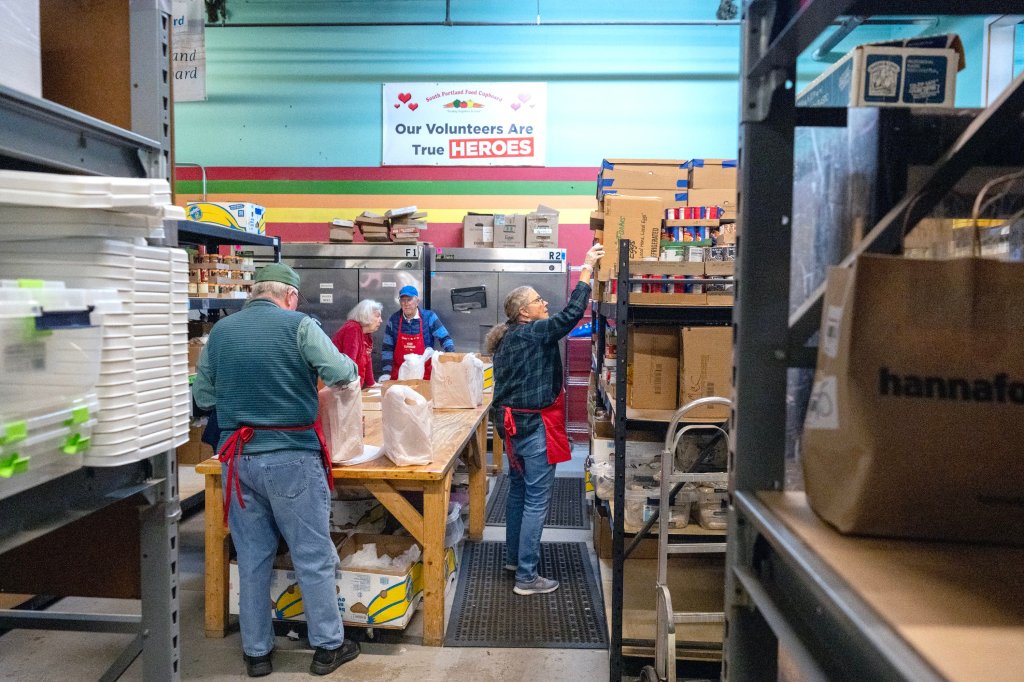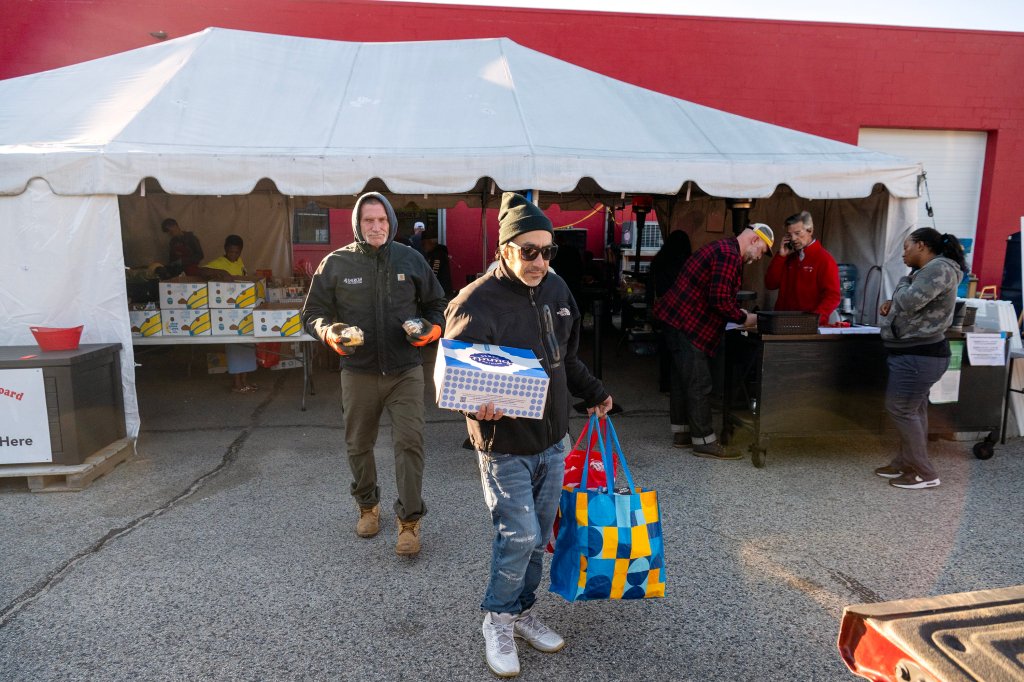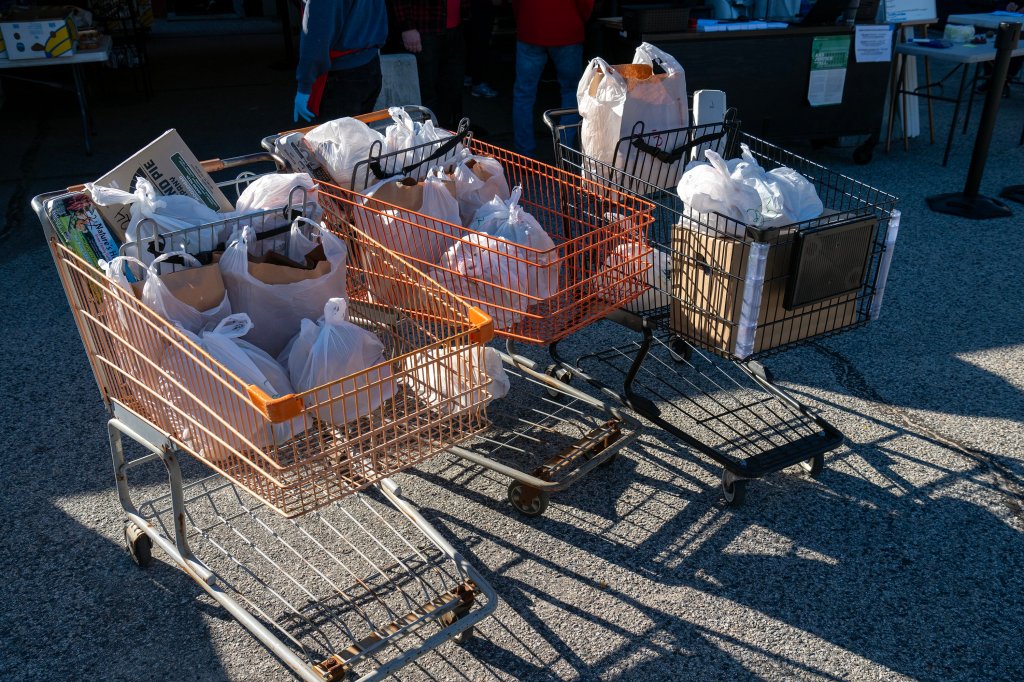
In the past two weeks, Sandy Swett has gotten more phone calls than ever from Mainers desperate for food. Through tears, they tell her they can’t feed their kids, that there’s nothing left for groceries after paying rent and utilities.
As executive director of the Harrison Food Bank, she’s used to hearing from people who rely on her for weekly boxes of groceries. But this feels different.
The biggest cuts in history to the Supplemental Nutrition Assistance Program are going into effect, and tens of thousands of Mainers will see their monthly benefit reduced or ended entirely — all while grocery, housing, energy and other costs continue to rise.
“This is the United States. We’re not a third-world country. This can’t happen,” said Swett, who worries that food pantries won’t be able to keep up.
Ian Yaffe, director of Maine’s Office of Family Independence, which runs the state’s SNAP program, said the new rules kicked in this month. But SNAP recipients have some time to meet them — three months in most cases — so state officials don’t yet know how many Mainers are losing benefits. The Center on Budget and Policy Priorities, a left-leaning national think tank, estimates that number could be about 10,000.
The One Big Beautiful Bill, approved by Congress over the summer, slashes some or all benefits for certain groups — including veterans, homeless people and survivors of domestic violence and human trafficking — by removing exemptions to the 80-hour-a-month work requirement for able-bodied adults.
The law also ended exemptions for many adults, including older people up to age 65 and parents of children 14 and older. State officials estimate 30,000 of the 176,000 Mainers who receive SNAP but didn’t have work requirements previously will now have to meet them in order to receive assistance.
Roughly 40 million people in the United States use SNAP, a program long considered the most effective way to reduce food insecurity.
An analysis by the Urban Institute, a think tank in Washington, D.C., found that 22.3 million American families will lose some or all of their SNAP benefits, with 5.3 million households — most of them working families and families with children — set to lose at least $25 in benefits per month.
Advocates and leaders of hunger prevention programs say the changes will be devastating in Maine, which has the highest childhood food insecurity rate and second-highest overall food insecurity rate in New England.
“We’re expecting a tsunami of food insecurity in our state and across the country,” said Anna Korsen, deputy director of Full Plates Full Potential, a Brunswick-based organization that focuses on ending childhood hunger in Maine.
Heather Paquette, president of Good Shepherd Food Bank in Auburn, and others who work in hunger prevention say food pantries cannot fill the gaps that will be created by the SNAP changes. For every nine meals that SNAP provides, food pantries can only provide one.
“We cannot food bank our way out of losing these safeguard measures,” Paquette said.
WHAT’S CHANGING
But Chris Edwards, director of tax policy studies at The Cato Institute, a conservative think tank, said the cutbacks are a tap on the brakes compared with the large spending increases on SNAP during the Biden administration; benefits jumped by 21% in 2021, in addition to temporary increases in government assistance programs — including SNAP — during the pandemic.
“The cuts are modest if you look at the way spending has soared,” Edwards said. “There was a huge run-up in benefits in recent years.”

U.S. Rep. Chellie Pingree, D-1st District, called the cuts “outright cruel.”
“This is outrageous,” she said in an interview. “The basic tenet of SNAP is that it supports American farmers and American people. The food our farmers grow should go to hungry people in this country. This makes that harder, all for tax benefits for the wealthy and wealthy corporations.”
Cutbacks to a program called the Thrifty Food Plan will reduce SNAP’s effectiveness because the program’s benefits won’t keep up with the rising cost of groceries. Any reduction will increase food insecurity in Maine, said Yaffe, of Maine’s Office of Family Independence.
SNAP-Ed, an educational program that teaches people how to shop for and cook healthy foods, is ending entirely, Yaffe said. About 20,000 people used the program last year, according to state statistics.
“It was a great evidence-based program that we knew worked,” Yaffe said. “We are disappointed to see that program end despite its track record of success and positive outcomes.”
Yaffe said Maine and other states are also facing substantially higher administrative costs, especially if they are unable to meet a new metric: a “payment error rate” of 6% or less. That rate measures how often a state overpays or underpays SNAP recipients’ benefit amounts.
When someone gets a higher-paying job or works fewer hours, their SNAP benefits need to be adjusted. But sometimes, the state doesn’t learn about the changes immediately, causing benefits to be calculated incorrectly.
Maine’s error rate is 10.26%, which is lower than the national average of 10.93% but still would require improvement in order not to lose $50 million in federal funding, Yaffe said.
He said the office will be working on improving the rate in the coming months, in part by checking with SNAP recipients more frequently to see if their income has changed.
Edwards, of The Cato Institute, said those reforms are important.
“State administrations have had no incentives to run the program efficiently and cut out fraud and abuse,” he said. “This was a reasonable effort to change the incentive structure.”
But James Myall, policy analyst for the Maine Center for Economic Policy, a left-leaning think tank, said conservatives are pushing a false narrative that people purposely stay unemployed in order to collect SNAP benefits.
“Most people who are able to work do work,” Myall said. “The SNAP benefit is a meager amount, so the idea that people are living off SNAP because they don’t want to work is false.”

The average monthly benefit in Maine for an individual enrollee was $176 in 2024, according to federal statistics.
Maine is also losing about $6 million in federal funding to administer the program, with the One Big Beautiful Bill shifting more administrative costs onto states.
Yaffe said DHHS will work with Maine lawmakers in the 2026 session to see what the state can do to mitigate the cuts.
“There’s no magic bullets here,” Yaffe said. “Many of the things we need to do will take time and resources.”
Edwards said shifting more responsibility to the states — which generally have to balance their budgets every year — is better for the financial health of the federal government.
“If a particular state wants to have a more generous SNAP benefit for their residents, the states can add in those benefits themselves,” Edwards said.

IMPACT OF THE CHANGES
Rural areas are expected to be hit particularly hard by the removal of work exemptions for people in communities with few opportunities. In Maine, those communities were primarily in the western and northern regions.
Alex Carter, a policy advocate with Maine Equal Justice, a nonprofit civil legal aid and economic justice organization, said people in those areas “are really panicked.”
“We’re hearing a lot from clients and our workforce navigators that people are really fearful because there aren’t jobs in those communities, there’s no easy transportation to jobs and volunteer opportunities, and food is harder to come by,” she said.
Some of those who will be directly impacted by the changes are among the most vulnerable members of the community and already face barriers to employment and housing, said Terence Miller, the advocacy director at Preble Street in Portland.
A Preble Street spokesperson said one client who is homeless told staff members that they rely on food stamps because they cannot work. The person said it is hard to accept that they have to depend on a shelter to provide food, but “SNAP makes me feel like I have a small say in my life.”
Kayla Dube, 23, of Lyman, said she relied on SNAP for years, especially when symptoms from her chronic illness made it difficult to work more than a few hours per week.
Dube still qualifies for benefits, but her monthly amount dropped from $292 per month to $24 when she got a job at the Maine Mall. Even that smaller amount will help, she said.
Having access to healthy food through SNAP and food pantries has helped Dube manage her symptoms.
“I will always be grateful for the resources that were available to me when I needed them,” she said. “I would have starved without SNAP.”
FOOD BANKS BRACING THEMSELVES
Good Shepherd Food Bank, which has more than 600 partner organizations across the state, is already hearing from food pantries that are seeing an influx of new people and struggling to keep up. Paquette, the president, said some have reported their lines are 40-50% longer than they were just a month ago.
The South Portland Food Cupboard was already bustling Thursday morning before people started arriving for their monthly appointments to pick up food. Nearly 50 volunteers worked inside the warehouse, unpacking donations and sorting groceries.
During the first hour, Nichole Mulrenin, of South Portland, came in to pick up food for her family of five. She gets $700 a month from SNAP, but that only lasts half the month now that food prices are going up, she said.

Mulrenin hasn’t been impacted by the changes yet but said a friend of hers had their benefit cut by $400.
“They’re struggling really bad,” she said.
The food cupboard has seen “a significant uptick” — about 20% — in recipients, said executive director Dwayne Hopkins. The organization is now serving nearly 700 families a month, or about 1,900 individuals, including people who have mentioned they’re getting less from SNAP.
Kevin Conroy, a board member and longtime volunteer, has watched the demand grow over the years. When the food cupboard first opened in 1997, it was considered a busy night when 10 people showed up. Last week, he and the other volunteers were preparing to serve at least 75 families.
So far, the cupboard has been able to keep up with its growing numbers. But Conroy said if donors cut back, it will be harder to serve everyone.
Swett, at the Harrison Food Bank, is also feeling the pressure to keep the shelves and coolers stocked with healthy food. She goes to stores across Greater Portland each week to pick up donated food and relies on other donors to help pay operating expenses.
Swett is already bracing for the colder months, when people can no longer rely on their gardens for produce and face higher heating bills. She worries that Mainers’ situations will become more dire — and that she won’t have enough food to help.
“What is going to happen this winter?” she said. “Everything is getting worse.”


We invite you to add your comments. We encourage a thoughtful exchange of ideas and information on this website. By joining the conversation, you are agreeing to our commenting policy and terms of use. More information is found on our FAQs. You can modify your screen name here.
Comments are managed by our staff during regular business hours Monday through Friday as well as limited hours on Saturday and Sunday. Comments held for moderation outside of those hours may take longer to approve.
Join the Conversation
Please sign into your CentralMaine.com account to participate in conversations below. If you do not have an account, you can register or subscribe. Questions? Please see our FAQs.